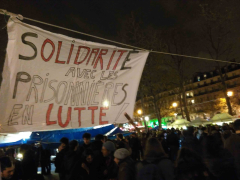
In Fleury-Mérogis, France’s biggest prison and one of its worst, women detainees have been organizing against new conditions of detention arranged by the new software GENESIS (Gestion nationale des personnes écrouées pour le suivi individualisé et la sécurité, National management of imprisoned people for individualized monitoring and security), an acronym that blurs its material reality for women incarcerated in Fleury-Mérogis. The software was sold under the aegis of efficiency and harmonization between the men’s quarters and the women’s quarters. In practice, this harmonization meant worsening the conditions of detention: reduction of the number of promenades, limitation of access to the gym and cultural activities, and reduction of visiting room sessions.
In December 2002, France ratified the United Nations’ resolution, Optional Protocol to the Convention Treatment or Punishment (OPCAT). As a result of that ratification, in 2007 the French parliament passed a law creating an independent public body “contrôleur général des lieux de privation de liberté” in charge of monitoring all places and institutions where people are locked up.
This independent body released a report in January 2016 concerning the conditions of detention of women, which includes women in jails, prisons, administrative (immigration) detention, and psychiatric detention.
Women prisoners represent 3.2% of the prisoners in France with 5 to 6% of women prisoners in administrative detention. Juvenile delinquents may be locked up in educational centers, which resemble a prison anyway. Girls make up 6 % of incarcerated minors. Proportionately, women in psychiatric hospital are in greater number; 38.21% of those committed to psychiatric detention are women. Historically, women have been the targets of psychiatric control.
The report points out that women are more susceptible to suffer from separation from family circles, and especially from their children, than men. Although by law women are entitled to the same rights as men, the gap between them is even wider in prisons and jails.
With the consolidation of detention centers, women have been sent further away from home. This situation is well known in the United States but is relatively new in France. The report insists on the inherent injustice of this situation since about 75% of the incarcerated women are mothers. The law demands that women’s incarceration respects their familial responsibilities. Further, most of the women are incarcerated for minor offenses. Among the 188 detention centers and prisons in France only 43 may receive women. Often the women’s side in a prison is simply very basic compared to the men’s side.
The report stresses the lack of services for women detainees and disparities among the various prisons and jails receiving women; these services go from health services to judicial services such as parole and day parole. The carceral administration justifies the inequality by claiming that there are too few women to merit more equipments or services.
The report recommends adding services, improving the conditions of detention, implementing the required access to school and other activities, all in the respect of the principle of equality.
Despite this detailed and clear report that demanded actions for revising the conditions of incarceration for women, Fleury-Mérogis’s administration launched GENESIS March 3d.
Immediately, the Basque women political prisoners incarcerated in Fleury-Mérogis organized women prisoners against this injustice. A support group has also been organized. Citizens outside the prison have written letters to the prison administration. Signs of solidarity with the women inside are key when women are locked up and may feel isolated. So each rally outside has to be heard inside.
The women prisoners’ demand is simple: “We call for dignified living conditions, they talk about rules. We talk about mutual assistance and sharing, they talk about logistics and “traffic.” We talk about humanity, they talk about laws. We talk about communicating and coming together, they answer with security and solitary confinement.” The response of the prison’s management has been harsh, 4 women have been sent to solitary confinement. Since May 10th, 5 men and 2 women have been on hunger strike in solidarity with the women in isolation.
This is a struggle against the logics of over incarceration producing a carceral and societal aberration that started in early 2000. It is a fight against a higher degree of materialistic dehumanization of prison conditions, another step toward a harmonization with the United States’ penitentiary hell. Solidarity with women prisoners is required, today in Fleury-Mérogis, tomorrow …

(Photo Credit: L’Envolée) (Image credit: Paris-Luttes.info)
